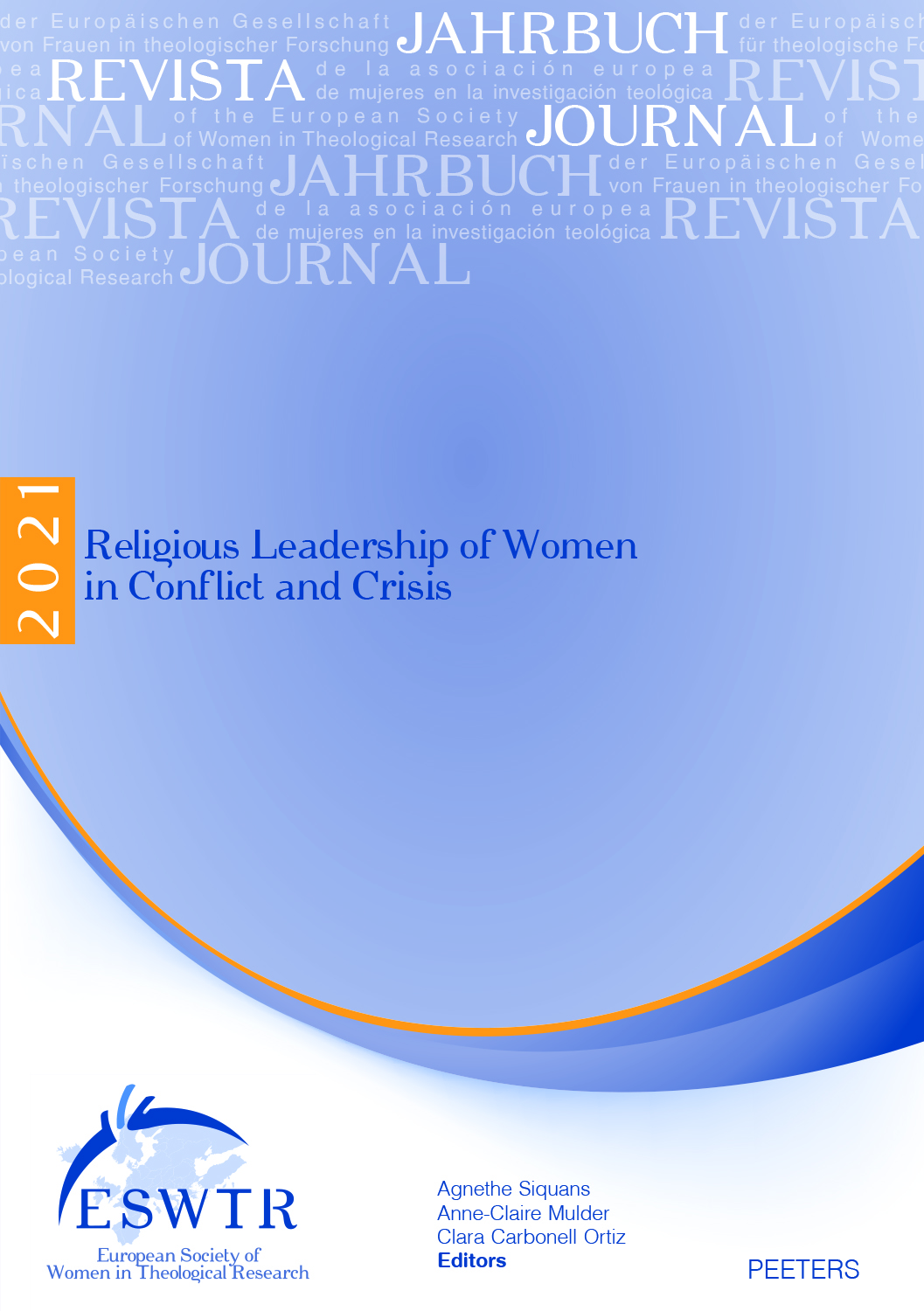 previous article in this issue previous article in this issue | next article in this issue  |

Preview first page |
Document Details : Title: Occupy Heaven Subtitle: Are God, Religion, and Politics beyond Rescue? Author(s): RIEGER, Joerg Journal: Journal of the European Society of Women in Theological Research Volume: 22 Date: 2014 Pages: 105-117 DOI: 10.2143/ESWTR.22.0.3040793 Abstract : Religion today presents itself mostly as a conservative phenomenon. Too often in history religion put itself on the side of the status quo. As a result, it may seem as if God, religion, and politics are indeed beyond rescue. This essay seeks to introduce alternative models, beginning with the realization that progressive forms of religion were part of significant transformations in history. Recent experiences with the Occupy Wall Street movement reflect many of these progressive characteristics, particularly the relation of progressive politics, economics, and religion. The critique that emerges from these experiences is not merely directed at dominant power, expressed today in politics and economics, but also at dominant power as it is embodied by religion. Such critique points to lived alternatives in which power does not flow from the top down but from the bottom up. These alternative experiences of religion and power throw new light on many Jewish and Christian traditions, which embody power in a different way. Not only could these traditions never be controlled completely by the prevailing empires, they also produced alternative embodiments of power, linked to alternative images of God. The result is a new understanding of solidarity, which has the potential to bring together the streams of the various liberation movements without neglecting differences and tensions. Based on this new solidarity, entrenched images of immanence and transcendence can be reconstructed, producing new visions of God, religion, and politics. Religion zeigt sich heute meist als ein konservatives Phänomen. Allzu oft hat sich Religion in der Geschichte auf die Seite des Status quo geschlagen. Und so scheint es, als ob Gott, Religion und Politik tatsächlich rettungslos verloren wären. Dieser Artikel will alternative Modelle einführen, angefangen mit der Wahrnehmung, dass progressive religiöse Formen an wichtigen Veränderungen in der Geschichte beteiligt waren. Die Erfahrungen mit der Occupy Wall Street Bewegung reflektieren viele dieser progressiven Merkmale, vor allem die Beziehung zwischen progressiver Politik, Wirtschaft und Religion. Die Kritik, die aus diesen Erfahrungen hervorgeht, richtet sich nicht nur gegen die herrschende Macht, wie sie heute in Politik und Wirtschaft realisiert wird, sondern auch gegen die herrschende Macht, wie sie die Religion verkörpert. Diese Kritik verweist auf gelebte Alternativen, in denen Macht nicht von oben nach unten fließt, sondern von unten nach oben. Diese alternative Erfahrungen von Religion und Macht werfen ein neues Licht auf viele jüdische und christliche Traditionen, die Macht anders verkörpern. Diese Traditionen konnten nie völlig von den herrschenden Mächten kontrolliert werden und mehr noch, sie produzierten alternative Verkörperungen von Macht, verknüpft mit alternativen Gottesbildern. Das Ergebnis ist ein neues Verständnis von Solidarität mit dem Potential, die Ströme der verschiedenen Befreiungsbewegungen zusammenzuführen, ohne Unterschiede und Spannungen zu vernachlässigen. Auf der Basis dieser neuen Solidarität können fest verwurzelte Bilder von Immanenz und Transzendenz rekonstruiert werden und neue Visionen von Gott, Religion und Politik entstehen. La religión actualmente se presenta frecuentemente como un fenómeno conservador. Con demasiada frecuencia en la historia de la religión, ésta se ha posicionado del lado del statu quo. Por consiguiente, puede parecer que Dios, la religión y la política están más allá de la Salvación. Este ensayo tiene por objeto introducir modelos alternativos, comenzando con la constatación de que las formas progresistas de la religión son parte de las transformaciones importantes en la historia. Las experiencias recientes con el movimiento Occupy Wall Street reflejan muchas de estas características progresistas, sobre todo la relación de la política progresista, la economía y la religión. Las críticas que surgen de estas experiencias no son sólo críticas dirigidas a la potencia dominante, expresadas, hoy, en la política y la economía, sino también críticas al poder dominante que se materializa en la religión. Tales críticas apuntan a las alternativas vividas en las que el poder no fluye de arriba hacia abajo, sino de abajo hacia arriba. Estas experiencias alternativas de la religión y el poder arrojan nueva luz sobre muchas de las tradiciones judía y cristiana, que encarnan el poder de una manera diferente. No sólo pueden estas tradiciones controlar completamente por los imperios dominantes, sino que también pueden generar alternativas de poder, ligados a las imágenes alternativas de Dios. El resultado es una nueva comprensión de la solidaridad, que tiene el potencial para reunir a las corrientes de los diversos movimientos de liberación sin dejar de lado las diferencias y tensiones. Basándose en esta nueva solidaridad, imágenes arraigadas de inmanencia y trascendencia se pueden reconstruir, produciendo nuevas visiones de Dios, de la religión y de la política. Fatal error: Uncaught mysqli_sql_exception: Column 'lib_id' cannot be null in /srv/data/web/vhosts/poj.peeters-leuven.be/htdocs/secure/POJ/tracker2.php:212 Stack trace: #0 /srv/data/web/vhosts/poj.peeters-leuven.be/htdocs/secure/POJ/tracker2.php(212): mysqli_query() #1 /srv/data/web/vhosts/poj.peeters-leuven.be/htdocs/article.php(579): track2_page_hit() #2 /srv/data/web/vhosts/poj.peeters-leuven.be/htdocs/content.php(636): include('...') #3 {main} thrown in /srv/data/web/vhosts/poj.peeters-leuven.be/htdocs/secure/POJ/tracker2.php on line 212 |
